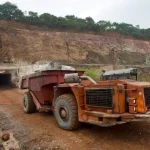The World Bank has initiated a $700 million program in March 2024 to bolster Zambia’s electricity sector. This initiative, named the National Energy Advancement and Transformation Program, seeks to enhance energy infrastructure in alignment with the government’s goal of achieving 10% GDP growth by 2030 and expanding job opportunities.
To meet this ambitious target, both public and private sector stakeholders are engaged in key energy infrastructure projects to energize various sectors of the Zambian economy. These investments are expected to propel economic growth and help Zambia reach its goal of universal electricity access by 2030.
Mining Sector Powered by Strategic Investments
In the realm of mining, the Copperbelt Energy Corporation, which provides electricity to mining operations, sold a 36.34% stake to Norway’s Norfund in January 2024, raising $145 million for power projects in Zambia. Considering the mining industry accounts for 72% of Zambia’s export earnings and 44% of its government revenues, a reliable power supply is critical to fully leverage this sector’s potential to boost GDP.
A robust power supply positions Zambia, home to the world’s sixth-largest copper reserves, to meet the increasing global demand for copper. This is pivotal as the country aims to elevate its copper production to three million metric tons over the next decade. Key mining endeavors, like the expansion of International Resources Holding’s Mopani Copper Mine and KoBold Metals’ Konkola West Copper Project, rely on consistent power availability to maximize their economic impact.
Agricultural Growth Fueled by Energy Security
In agriculture, Zambia collaborates with international bodies such as the Food and Agriculture Organization of the United Nations and the Czech Development Agency to promote energy solutions like bioenergy and solar power. Agriculture, which employs 59% of the workforce and contributes 3.4% to Zambia’s GDP, stands to gain significantly from enhanced energy services. Projects like the Luapala Biomass Energy Project and the 32 MW Makeni Biomass Power Plant are crucial for increasing resilience and boosting productivity in farming.
Broad Investments Spark Power Sector Growth
Zambia’s efforts to upgrade its energy infrastructure not only support vital sectors like manufacturing and education but also enhance its appeal for foreign direct investment. For instance, Israeli energy giant Gigawatt Global committed $100 million in August 2023 to develop a 71 MW solar power plant in Zambia. Additionally, Zambia is developing a $2 billion solar power project pipeline in collaboration with the United Arab Emirates, potentially increasing the nation’s power generation capacity by over 50%. These developments underscore Zambia’s strategic push to strengthen its energy sector and drive broader economic growth.















